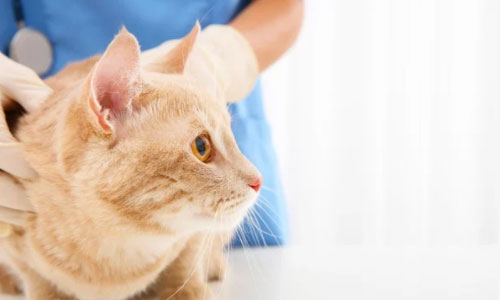Hyperthyroidism is a condition that occurs when there is an increased production of the thyroid hormone in cats. The thyroid hormone (T3 and T4) is produced by the thyroid glands that are situated in the cat’s neck. This gland also appears to be enlarged. If you find your cat’s neck to be swollen, you need to get it evaluated by the vet. The thyroid hormone regulates many major organs of the cat and it can lead to multiple health issues, if not diagnosed and treated in time.
This condition affects mostly middle-aged to older cats. When diagnosed early, the issue can be corrected in most cases. Hyperthyroidism is often due to a non-cancerous tumor. In certain rare cases, the enlargement may occur due to malignant tumors.

Hyperthyroidism symptoms in cats
You may not be able to tell whether your cat is suffering from hyperthyroidism initially, because it can be difficult to find any behavioural changes. But the symptoms become more apparent later on. Here is what you need to look for.
- Loss of weight, even when your pet is eating well.
- Increased appetite. Your cat seems to be hungry all the time.
- Increased intake of water
- Diarrhea. You may find the litter box to be full all the time.
- Frequent urination. You may find the cat peeing anywhere around the house.
- Laboured breathing
- Unkempt or matted hair
- Vomiting
- Appears to be overstimulated or restless
- Becomes highly irritable
- Appears to be weak
Any cat breed may be affected with hyperthyroidism. The actual cause of hyperthyroidism in cats may not be clear, but studies indicate that being exposed to certain thyroid hormone disrupting chemicals in the diet over a period of time may lead to this condition. If the cat food is too rich or too deficit in some of the compounds, it can cause hyperthyroidism. Also, if left untreated, hypothyroidism in cats can lead to severe health complications, possibly even resulting in the loss of your beloved pet.
Treatment options
Medications
Your vet may prescribe drugs to control the thyroid functioning. These may be short-term or long-term depending on the severity of the condition. Some cats may experience some side effects from the drugs but this is an inexpensive treatment that requires regular monitoring of the condition with tests.
Surgery
The affected thyroid gland is operated and removed surgically by medical professionals. This procedure provides permanent cure in most cases.
Radioactive Iodine therapy
This treatment requires administration of an injection which helps destroy the abnormal growth of cells and maintain normal levels of thyroid hormone.
Diet
Your vet may suggest a diet that is minimal in iodine for your cat. This is known to be helpful in controlling hormone levels in many cases, but it’s long term affects are still under research.





